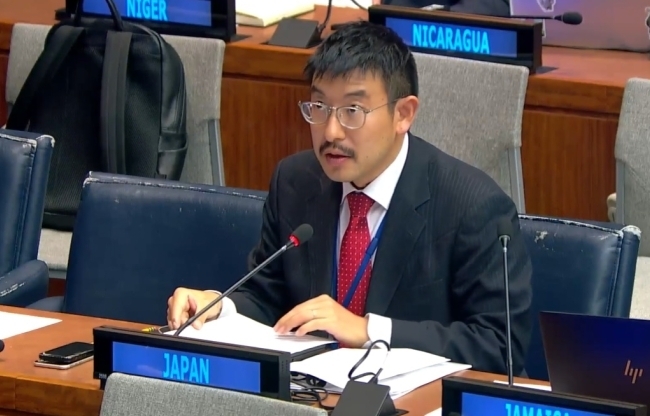Statement by Mr. SHOJI Takashi, Counsellor, Permanent Mission of Japan to the United Nations at the Meeting of the Fourth Committee, 79th Session of the United Nations General Assembly, on Agenda Item 47: Effects of atomic radiation
2024/10/21

(As delivered)
Thank you, Madam Chair, for giving me the floor. I also thank Dr Baatout for her useful briefing on the work of the United Nations Scientific Committee on the Effects of Atomic Radiation (UNSCEAR).
UNSCEAR plays a vital role in providing scientific assessments and reports on the effects of exposure to ionizing radiation. We commend UNSCEAR’s continued work to broaden knowledge and deepen understanding of the levels, effects and risks of exposure to ionizing radiation, based on independent and evidence-based scientific research.
As a country fully committed to the safety of nuclear technology, Japan values the present functions and independent role of UNSCEAR.
I would like to proudly mention that Dr KANDA Reiko, Director General of National Institute of Radiological Sciences, National Institutes for Quantum Science and Technology (QST) of Japan has been elected for a Vice-Chair of the bureau of the current and next session of UNSCEAR. Japan remains committed to furthering its cooperation with UNSCEAR through her and thanks for the Member States’ generous support to her election and work as a Vice-Chair.
Among various scientific activities of the Committee, we particularly appreciate its active and continued outreach in Japan and to the international community on its scientific findings on the levels and effects of radiation exposure due to the accident at the Fukushima Daiichi Nuclear Power Station. Our delegation would like to reaffirm Japan’s deep and long commitment to nuclear safety.
To conclude, Japan reiterates its firm commitment to support the UNSCEAR’s work and contributions to the world.
I thank you.
UNSCEAR plays a vital role in providing scientific assessments and reports on the effects of exposure to ionizing radiation. We commend UNSCEAR’s continued work to broaden knowledge and deepen understanding of the levels, effects and risks of exposure to ionizing radiation, based on independent and evidence-based scientific research.
As a country fully committed to the safety of nuclear technology, Japan values the present functions and independent role of UNSCEAR.
I would like to proudly mention that Dr KANDA Reiko, Director General of National Institute of Radiological Sciences, National Institutes for Quantum Science and Technology (QST) of Japan has been elected for a Vice-Chair of the bureau of the current and next session of UNSCEAR. Japan remains committed to furthering its cooperation with UNSCEAR through her and thanks for the Member States’ generous support to her election and work as a Vice-Chair.
Among various scientific activities of the Committee, we particularly appreciate its active and continued outreach in Japan and to the international community on its scientific findings on the levels and effects of radiation exposure due to the accident at the Fukushima Daiichi Nuclear Power Station. Our delegation would like to reaffirm Japan’s deep and long commitment to nuclear safety.
To conclude, Japan reiterates its firm commitment to support the UNSCEAR’s work and contributions to the world.
I thank you.
